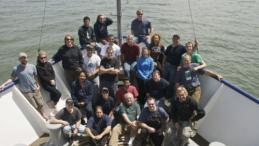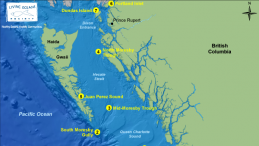Finding Coral Expedition returns to Vancouver
Vancouver -- Living Oceans Society’s Finding Coral Expedition arrived back in Vancouver on June 22 after a successful two week study of deep sea corals off the coast of British Columbia. The research team of international scientists dove in single person submarines at six different dive sites in Queen Charlotte Sound, Hecate Strait, and Dixon Entrance. At five of the sites the team identified deep sea corals and many other creatures.
“Exploring the Pacific Coast of Canada by submarine was a profoundly moving experience,” said Jennifer Lash, Executive Director if Living Oceans Society and the leader of the Finding Coral Expedition. “We explored places no one has ever been before and saw spectacular corals that were absolutely crawling with life.”
The research team and identified at least 12 different kinds of coral at depths of up to 518 meters.
“It was an experience of a lifetime to go to the bottom of the ocean and see these beautiful deep sea corals,” said Dr. Lance Morgan of Marine Conservation Biology Institute. “The video that we filmed and the samples we gathered fill an important gap in our knowledge of deep sea corals along the west coast of North America.”
In B.C. corals are virtually unprotected and remain vulnerable to impacts from bottom trawling and other harmful fishing gear. Living Oceans Society is concerned that these fishing practices will affect commercial fish stocks and the health of the ecosystem as well as the fate of the corals.
“Our efforts to find deep sea corals opened all of us to the splendour and glory of the deep sea,” said Dr. Sheila McKenna. “In addition to finding 12 kinds of coral, we found at least 38 species of fish, and over 50 species of invertebrates. Further review of our video tapes will reveal more species.”
Deep sea corals are fragile, long lived animals that provide habitat for other animals in the deep sea. Despite decades of bottom trawling in B.C., the expedition was able to find important deep sea coral forests that appear to be healthy.
“We will share the data gathered by the Finding Coral Expedition in order to advance the world’s knowledge about deep sea corals,” Lash said. “We hope that others who have information about deep sea corals such as universities, government agencies and fishermen will also share their information so the best possible conservation strategy can be developed.”
-30-
Contact Information
Geoff Gilliard, Communications Manager, Living Oceans Society 604-999-6273


